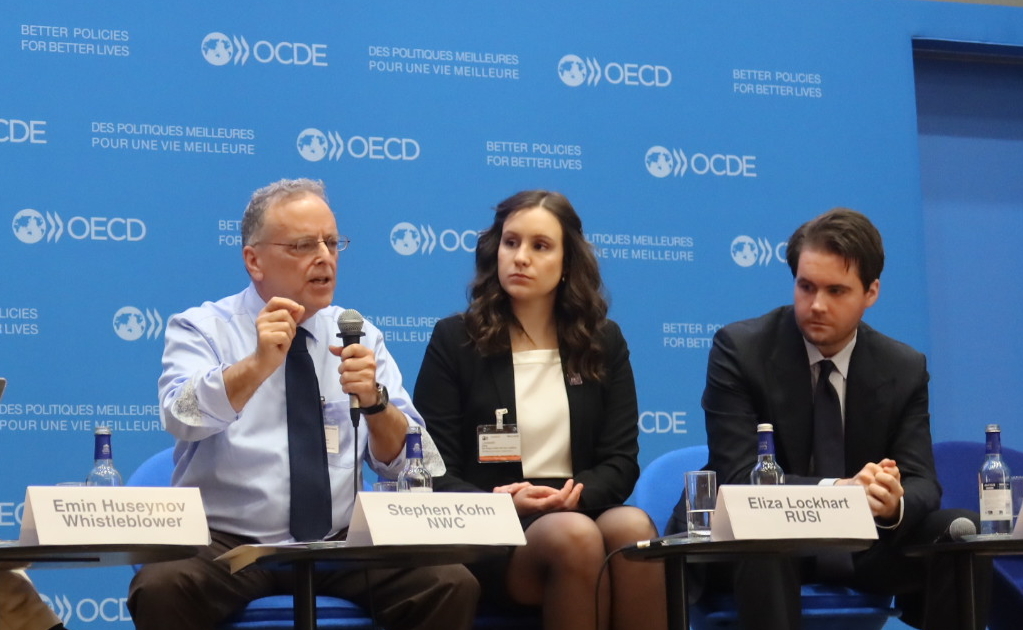Introduction to Corruption in China
China has experienced astronomical growth in the last few decades, and as a result, has also experienced widespread corruption. Given the county’s size and complex bureaucracy, and the move from a planned economy to a market economy, corruption has been able to grow and thrive, but has also slowed because of Xi Jinping’s anti-corruption campaign, which has lead to over 2.4 million government officials being prosecuted for corruption.
Still, corruption in China has far-reaching consequences. It leads to inefficient markets and social inequality, as the benefits one receives are given to those in power and their connections. In China, the most common forms of corruption include bribery, extortion, nepotism, and embezzlement.
In this article, we’ll talk more about corruption in China, and how it undermines institutions meant to serve the public, hinders economic development, and erodes public trust. Individuals who report corruption involving U.S. publicly traded companies may be eligible for a whistleblower award under the Dodd-Frank Act, which enhances enforcement of the Foreign Corrupt Practices Act.
Continue reading to learn more, and to find out which U.S. laws are available to those who witness corruption and would like to report their concerns.
History of Corruption in China
Corruption in China dates to Imperial China, where officials exploited their positions for personal gain – the definition of corruption. The spread of corruption can be connected to the idea of renzhi (人治; rénzhì; ‘Rule of the people’) as opposed to the legalist “rule of law” (法治; Fǎzhì).
Confucians believed that focusing on making money was for ordinary people, not for those who truly understood their philosophy. Instead, it was suggested that they base their actions on justice and fairness. Relationships should be built on trust and respect, not on profit. This kind of moral behavior was rare and only found in a few people.
Today and throughout history, the concept of “guanxi,” or personal connections and business relationships, also plays a major role in securing benefits and advancing one’s career. Guanxi necessitates a personal connection as a foundation for business partnerships. These relationships tend to be deeper and more committed than those typically found in Western social circles.
Mao Zedong Era (1949-1976)
The Mao Zedong era spans from the establishment of the People’s Republic of China in 1949 to Mao’s death in 1976. This period is characterized by significant political, social, and economic upheaval.
The establishment of the People’s Republic of China in 1949 aimed to eradicate corruption. However, since the Communist Party of China assumed power in 1949, corruption has been endemic, with high-ranking officials exploiting their positions for personal gain.
Despite efforts to create a socialist society, corruption continued to flourish. Furthermore, the Cultural Revolution (1966-1976) led to social upheaval and economic disruption, creating opportunities for corruption to flourish.
Opening Up Period (Late 1970’s)
China’s opening up period typically refers to the economic reforms initiated by Deng Xiaoping in the late 1970s. This marked a significant shift from the centrally planned economy of Mao Zedong’s era towards a more market-oriented system.
It’s important to note that economic reforms in China during the 70s led to a period of rapid growth. This led to prosperity, but also corruption. The decentralization of economic power, the growth of the private sector, and the influx of foreign investment exacerbated corruption problems.
Chinese political scientist Minxin Pei argues that failure to contain widespread corruption is among the most serious threats to China’s future economic and political stability. He estimates that bribery, kickbacks, theft, and waste of public funds costs at least three percent of GDP.
Types of Corruption in China
Corruption is a very significant problem in China, impacting all aspects of administration, law enforcement, healthcare and education. Graft is the most common form of corruption, which involves the misuse of public funds for personal gain. This includes bribery, kickbacks, embezzlement, and theft. In specific, the most common form of corruption we see in China today includes the following:
Political Corruption
Political corruption involves the abuse of power by government officials for personal gain, such as:
- Bribery: offering or receiving money or other benefits (or gifts) in exchange for political favors or preferential treatment, such as during a contract bidding process.
- Nepotism: appointing family members or friends to government positions, even though they do not meet the right qualifications.
- Crony capitalism: favoritism towards businesses owned by friends or associates of government officials. This is similar in nature to clientelism.
Economic Corruption
Economic corruption concerns itself with financial activities involving the misappropriation of public funds or resources, like:
- Tax evasion: avoiding or underpaying taxes.
- Embezzlement: misappropriation of funds one is responsible for.
- Fraud: deceptive or dishonest business practices.
- State-owned corruption: abuse of power within state-owned companies.
Social Corruption
Social involves bribery or favoritism in receiving essential public services, such as:
- Bribery in education: offering or taking bribes to gain admission to top schools or obtain higher grades.
- Bribery in healthcare: paying bribes for preferential treatment or access to medical resources.
- Corruption in land acquisition: abuse of power in land acquisition, often benefiting developers with connections to corrupt officials.
Mass Surveillance
China has implemented a vast and sophisticated surveillance system that monitors its citizens on an unprecedented scale. This system, often referred to as the “Great Firewall of China,” is used to control information, track individuals, and maintain social order.
Key components of mass surveillance in China:
- Camera surveillance: China has an vast network of cameras in public spaces, including streets, buildings, and homes. These cameras are equipped with facial recognition technology, allowing authorities to identify and track individuals.
- Internet surveillance: the Chinese government heavily censors the internet, blocking access to foreign websites and social media platforms. It also monitors online activities, including social media posts, search history, and online purchases.
- Data collection: the government collects vast amounts of personal data from citizens, including biometric information, financial records, and travel history.
- Social credit system: this system assigns citizens a score based on their behavior, with implications for access to services and opportunities.
- Use of technology: artificial intelligence, big data, and other advanced technologies are employed to analyze information and identify potential threats.
Impacts of mass surveillance:
- Human rights concerns: the system has raised significant concerns about privacy, freedom of expression, and human rights.
- Social control: the government uses surveillance to maintain control over the population and suppress dissent.
- Economic implications: the system has implications for businesses operating in China, as they must comply with data regulations and surveillance requirements.
The extent and impact of mass surveillance in China is complex and evolving. While the government claims that the system is necessary for security, critics argue that it breaches privacy and fundamental freedoms.
Examples of Corruption in China
There are many examples of corruption in China, which have been covered quite well. Below are a few the most notable:
Clear Channel Outdoor Holdings, Inc. (2023)
Clear Channel Outdoor Holdings, Inc. paid a $26 million settlement to the SEC in September 2023 to resolve allegations of Foreign Corrupt Practices Act (FCPA) violations. The company’s former majority-owned Chinese affiliate is accused of bribing Chinese officials to secure outdoor advertising contracts.
Albemarle Corporation (2023)
Albemarle Corporation agreed to a $218 million settlement with the Department of Justice and the SEC in September 2023 to resolve FCPA charges. The company is accused of using agents to bribe government officials in multiple countries, including China, to win business.
Koninklijke Philips N.V. (2023)
Koninklijke Philips N.V. paid a $62 million fine to the SEC in May 2023 to settle allegations that its Chinese subsidiaries bribed government hospital officials in violation of the FCPA’s accounting and internal control provisions.
Siemens AG (2007)
Between March 12, 2001 and September 30, 2007, Siemens AG, a German company, violated the FCPA by engaging in a widespread and systematic practice of paying bribes to foreign government officials to obtain business. They had to pay large fines, amounting to $1.6 billion.
The Effects of Corruption in China
Corruption in China has many negative effects. Not only does it divert resources away from efficient projects and into the pockets of the elite, but it also creates an unfair barrier to entry in the market. This slows the growth of the economy that could otherwise thrive.
It can also lead to income inequality, where these same elites accumulate wealth at the expense of others. And those who obtain funds through illegal transactions may move those funds offshore, leading to a erosion of the economy, and public trust. This can lead to protests, such as the famous 1989 Tiananmen Square protests.
In some cases, corruption can also lead to violations, as seen in the case of Hewan village, where farmers were forced off their land to make way for a corrupt development project. This in turn also leads to environmental damage.
Some may argue that corruption in China can act as a lubricant for the bureaucracy, facilitating business transactions that might otherwise be stalled by excessive regulations. Or that it may also be seen as a necessary evil during a period of economic reform and opening up.
Anti-corruption Efforts in China
President Xi Jinping’s anti-corruption campaign began in 2012, which vowed to crack down on “tigers and flies,” or high-level officials and civil servants involved in bribery or an abuse of power. This campaign removed over 120 officials, including dozens of military officers, senior executives of state-owned companies, and five leaders. As of 2023, 2.3 million government officials have been prosecuted, and this type of anti-corruption effort has been integral to Xi Jinping’s leadership.
United States Anti-Corruption Efforts
The United States has established a robust legal framework to combat corruption both domestically and internationally. Key components of this framework include anti-money laundering (AML) laws, asset recovery programs, and corporate accountability measures.
Anti-Money Laundering (AML) and Asset Recovery
The U.S. Treasury Department’s Financial Crimes Enforcement Network (FinCEN) oversees the implementation of anti-money laundering regulations. Financial institutions are required to report suspicious activities and maintain detailed records. To incentivize reporting of financial crimes, the government offers substantial awards to individuals who provide information leading to the conviction of money launderers.
The Foreign Corrupt Practices Act (FCPA)
The Foreign Corrupt Practices Act (FCPA) prohibits U.S. companies from bribing foreign officials to secure business. It also mandates robust internal controls to prevent such activities. For example, a U.S. company caught bribing a foreign official faces hefty fines and potential imprisonment for executives involved.
The Dodd-Frank Act
The Dodd–Frank Wall Street Reform and Consumer Protection Act expanded whistleblower protections, including those reporting FCPA violations. Individuals who expose corporate misconduct can receive significant rewards if their information leads to successful enforcement actions. For instance, an employee who uncovers a bribery scheme can report it to the Securities and Exchange Commission (SEC) and potentially receive a substantial award.
The False Claims Act
The False Claims Act, primarily targeting government fraud, has also been used to combat corruption. Whistleblowers can sue on behalf of the government and share in recovered funds. For example, a whistleblower who exposes a defense contractor to overcharging the government for defective equipment can file a qui tam lawsuit under this act.
Conclusion
Corruption in China is an issue exacerbated by economic reforms, which continues to present challenges to the country’s development. While the government has created measures to combat this problem, its effectiveness remains contested. The United States has established a strong legal framework to deter and punish corrupt practices involving US companies. By offering substantial rewards and protections to whistleblowers, these laws encourage the disclosure of illicit activities and promote corporate accountability.
Reporting Corruption in China Using U.S. Whistleblower Laws
If you have knowledge of corruption involving fraud against the U.S. government or bribery of foreign officials by a U.S. company, we can help. Our firm specializes in complex corruption cases, including the groundbreaking $230 billion money laundering scheme exposed by our client, Howard Wilkinson. We understand the risks whistleblowers face and are committed to protecting your rights. Let us leverage our expertise to hold corrupt entities accountable. Contact us today for a confidential consultation.






